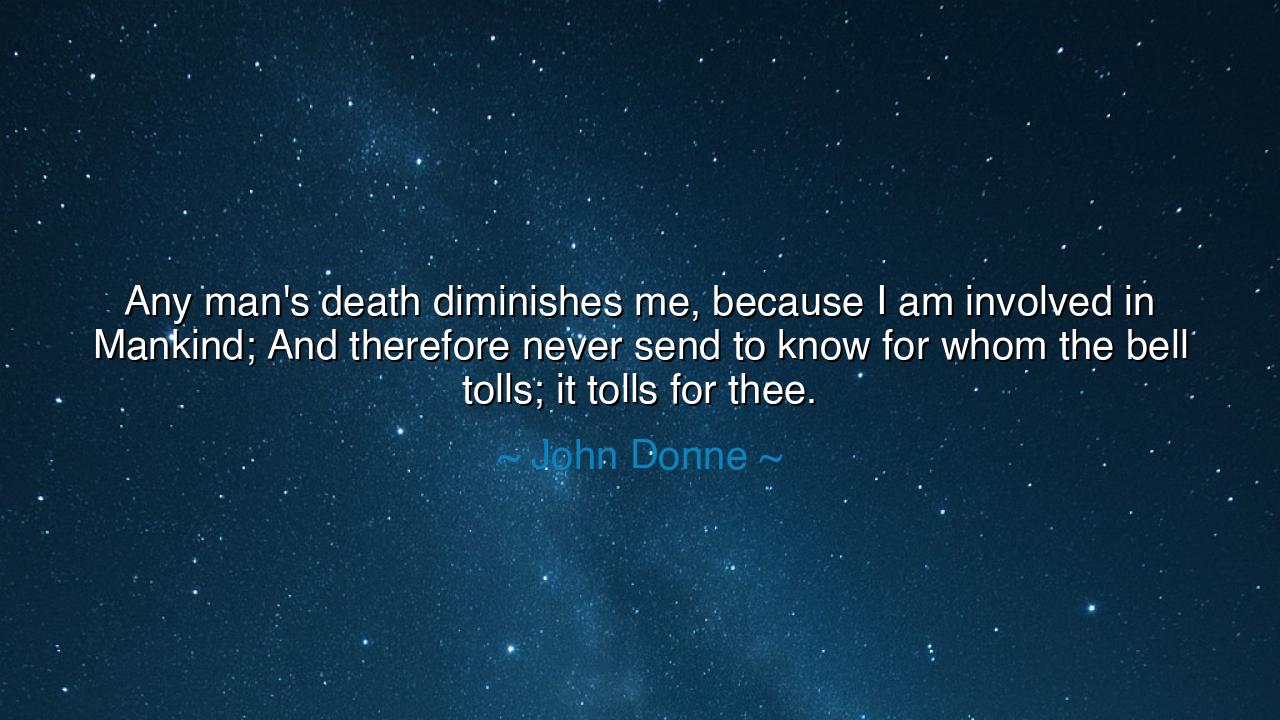
Any man's death diminishes me, because I am involved in Mankind;
Any man's death diminishes me, because I am involved in Mankind; And therefore never send to know for whom the bell tolls; it tolls for thee.






“Any man’s death diminishes me, because I am involved in Mankind; And therefore never send to know for whom the bell tolls; it tolls for thee.” — so wrote John Donne, the great English poet and divine, whose heart burned with both faith and human compassion. These words, drawn from his Meditation XVII, ring across the centuries like the tolling of the bell itself — solemn, haunting, yet filled with wisdom. They remind us that in the great fabric of existence, no life stands alone. The loss of one soul weakens the whole; the sorrow of one heart touches every other. For in truth, we are all one body, and to wound one part is to wound the whole.
The origin of this quote comes from a time of sickness and near death. Donne, who had once been a courtier and a poet of passion, lay ill, listening to the church bells that marked the passing of others. In those hours of weakness, when the veil between life and death grew thin, he realized a truth deeper than theology — that the death of another was not something distant or abstract, but something personal. Each bell tolling for a stranger was, in fact, tolling for him as well, for the life of every human being is bound to every other. He wrote then not from theory, but from revelation — that to be human is to be joined in a sacred fellowship of mortality.
When Donne writes, “Any man’s death diminishes me, because I am involved in Mankind,” he declares that we are not isolated beings drifting through separate fates, but threads woven into the same tapestry. The suffering or death of another is not apart from us, but within us, for we share a single destiny — to live, to struggle, and to pass beyond this world. His words echo the voice of eternity itself, proclaiming that compassion is not charity, but recognition — the awakening to the truth that another’s life is also your own.
Consider the great tragedies of history, when this truth has shone most clearly through the darkness. In the fields of Flanders during the Great War, when men of many nations fell side by side, strangers became brothers in the shared agony of death. It was then that the poet John McCrae wrote, “In Flanders fields the poppies blow, between the crosses, row on row.” The blood of one became the sorrow of all. It is in moments like these that Donne’s bell tolls loudest — reminding us that war, famine, and suffering do not belong to the fallen alone, but to the living who remain bound to them. The loss of one man is the loss of all humanity, for human life is indivisible.
“Never send to know for whom the bell tolls; it tolls for thee.” In these words, Donne warns against the illusion of separation. He tells us not to ask for whom the funeral bell rings, because it rings for us all. The death of another is not a spectacle to be observed from afar; it is a mirror held up to our own mortality. The bell does not call the dead, but the living — to remember, to awaken, to live more gently and more wisely, knowing that our days are shared in the great circle of being. Every toll is a summons: to empathy, to humility, to reverence for the fragile breath that unites us.
In this teaching, Donne also reveals the antidote to selfishness and cruelty. For if every man’s death diminishes us, then every act of kindness enlarges us. To heal another is to heal ourselves; to love another is to strengthen the whole of humankind. The man who hears the bell and feels no sorrow is already dead in spirit, while the one who weeps for a stranger partakes in the divine. Thus, the highest form of wisdom is compassion, and the truest strength is found not in dominance, but in unity.
Therefore, my listener, remember this lesson: you are not alone, nor are you untouched by the suffering that fills the world. When you see pain, do not turn away; when you hear the bell toll for another, know that it calls you too. Live with awareness that to care for others is to honor yourself, and that every act of mercy preserves the sacred thread that binds us together. The bell will toll for each of us in time — but until that hour, let us live as those who understand its song.
And so, take Donne’s words as both warning and blessing: that life is not measured by isolation, but by connection. The death of one is the reminder of the destiny of all; yet within that destiny lies the power of love, the force that makes humanity one. When next you hear sorrow’s bell, let it awaken not fear, but reverence — for in that tolling lies the voice of truth, whispering across the ages: You are part of mankind, and mankind is part of you.






AAdministratorAdministrator
Welcome, honored guests. Please leave a comment, we will respond soon